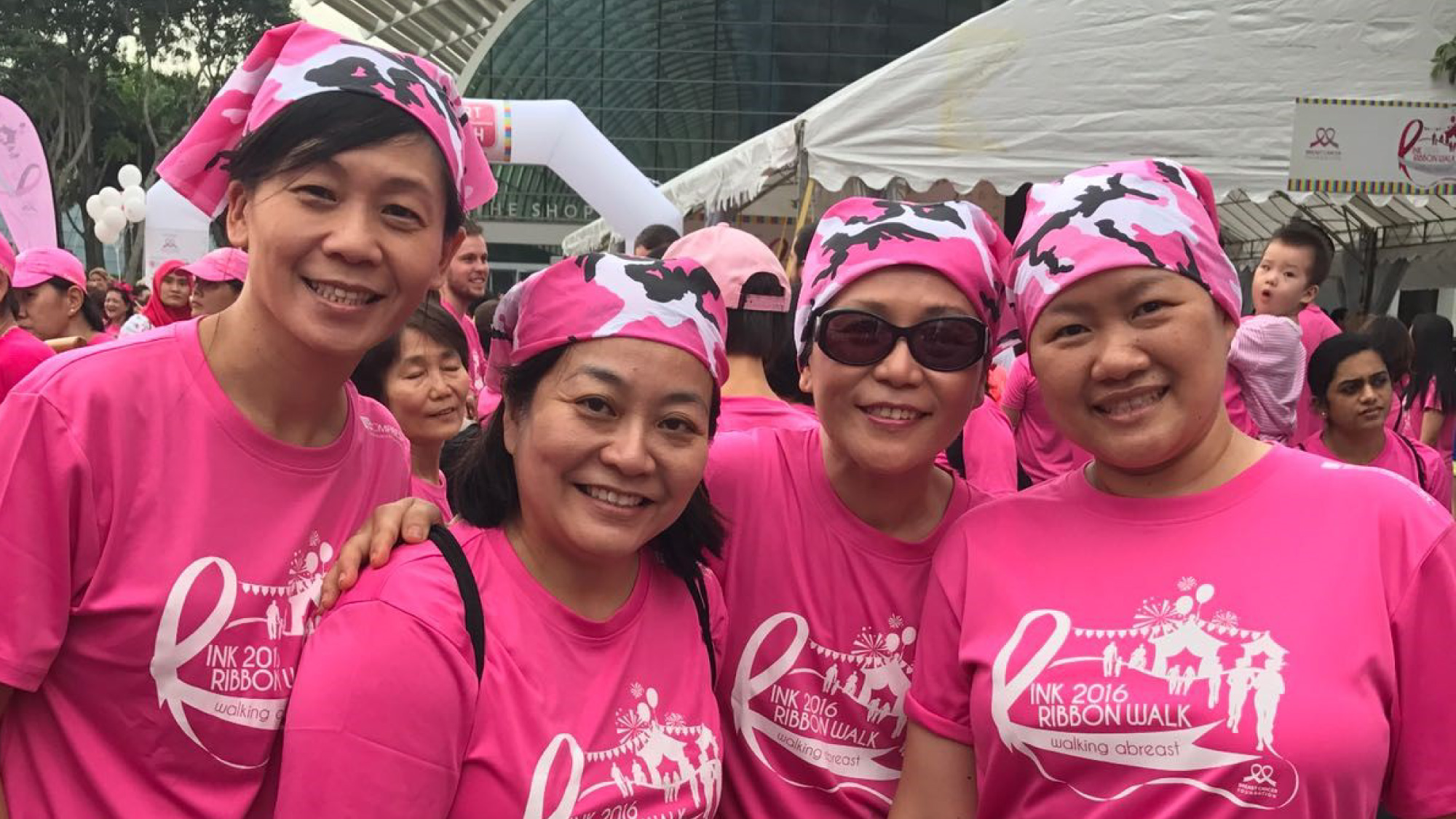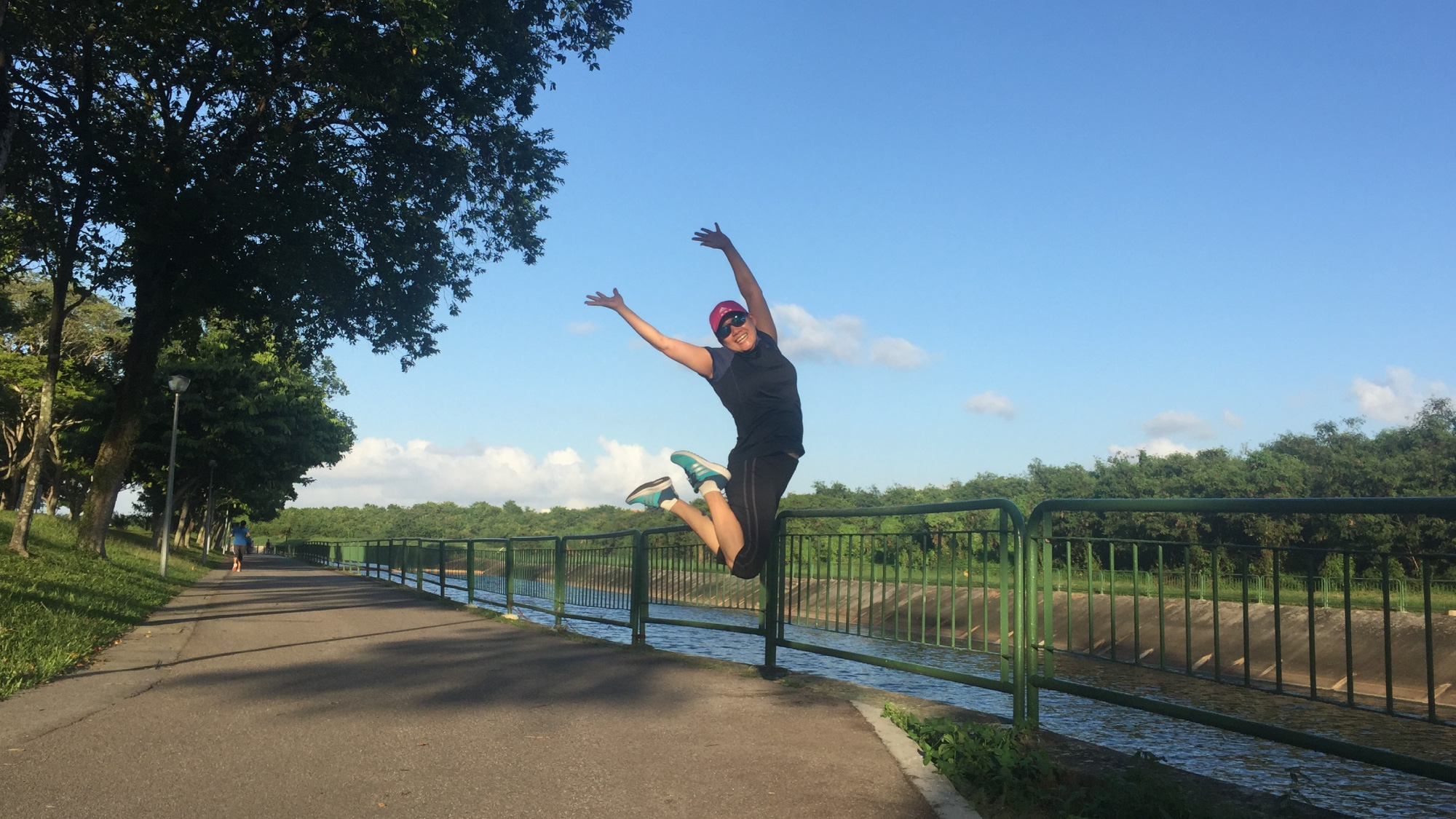Battling Cancer
Ms Lee with the staff at Mount Elizabeth Hospital who cared for her after her mastectomy and breast reconstruction surgery.
A cancer patient shares about her personal struggle to cope with the disease.
New Year’s Eve 2015 brought news that turned Ms Lee Siew Hoon’s life topsy turvy.
A biopsy report from her breast surgeon at Mount Elizabeth Hospital confirmed that she had breast cancer. For months, the executive producer worried about a painful lump in her right armpit, though a mammogram scan earlier did not detect anything amiss.
The news left Ms Lee in a state of shock, and only when she reached home did it sink in. She was left pondering what was left of her life over the New Year.
“Even though I had a bad feeling, I never expected myself to have cancer.”
It was hard to break the news to her mum, who has nose cancer, and in her 70s.
Within days, Ms Lee went for a positron emission tomography (PET) scan. It confirmed her cancer was Stage 4. It had spread to the lymph nodes near her collarbone and armpit, and the base of her spine.
Immediately on the same day, she was referred to an oncologist, who charted her treatment plan and discussed with her about the side effects that she would experience.
Over the next couple of months, she underwent a round of chemotherapy, and then mastectomy and breast reconstruction, followed by another round of chemotherapy and radiation therapy to treat her breast cancer. Soon after, she was given hormonal therapy drugs to stop her ovaries from producing oestrogen, and to prevent her body from turning fat into oestrogen, which powers her cancer cells.
“When I started on the hormonal drug, it parachuted me into menopause without a transition, so I had very bad moods. I felt very low and had to take drugs to lift my spirits, happy pills as we call it,” she said.
During chemotherapy, she also experienced periods of forgetfulness, a “mental fog” that clouds her train of thoughts. Conversations get disrupted, and fatigue sets in.
“I always tell my friends it is like a visit to hell. It’s the best way I can describe chemotherapy. It’s a living hell.”
But cancer is as much a mental battle, as it is a physical one.
“I had to push myself and motivate myself to overcome all the side effects. In a way, I felt very lonely during and even after the treatments. I felt that people around me don’t understand what I am going through. This is one aspect which I am not prepared for. I find it difficult to connect with people sometimes.”
Through her year-long battle with cancer, her close friends and family have been her constant source of support.
“Even though I was told it was a mental battle, I didn’t expect it to be this tough. I am very grateful that I have a lot of friends: my Buddhist friends, my classmates, my colleagues. They send me gifts. They send me messages. They come and take me out for makan (meals). They send me soups. I think it helps in how you cope.”
Siew Hoon’s husband, a private tutor, is her primary caregiver.
Although he accompanies Siew Hoon for her chemotherapy sessions and medical appointments, and takes care of her needs in hospital or at home, she felt that he was unable to fully comprehend what she was going through sometimes.
“Sometimes you feel very alone, because no one else can help you, not even the one closest to me, like my husband. He may see that I am suffering, but there is nothing he can do to alleviate my suffering,” she said.

On October 1, 2016, Ms Lee took part in her first Pink Ribbon Walk with her friends, who donned bandanas in support.
Still, it is a journey that the couple is willing to take on together.
“In a way, it is rediscovering each other, like how we deal with things in life. Every time I get into an emotional outburst, or feel sad, it strains our relationship. But after that we talk about it, and try to find a solution to it. It is a work in progress, because it is a new me, so it’s difficult.”
Amid the arduous battle with cancer, a silver lining: all her medical costs are fully paid for by the insurance coverage that she had bought.
Ms Lee is embarking on a new drug, which has just been approved for use in Singapore. Her oncologist told her the drug has helped women with metastatic breast cancer like hers to postpone relapse. The drug costs $9,000 a month, but her insurance covers it.
After a hiatus of a year, she is also looking to return to work in early 2017 at broadcaster Mediacorp. She has made a will, but has stopped making plans for the long term, apart from short holidays. She spends her time exercising, copying Buddhist sutras, reading, making new friends and sharing her experience on social media to raise awareness of cancer. She also accompanied a friend to her first chemotherapy session for moral support.
“I just live every day to its fullest. I came out of cancer with a totally different attitude towards life. The only future plans I made are for my funeral, I think that’s important. You know a lot of us plan for birthday parties, weddings, but we almost never plan for our funerals, and it is going to leave our loved ones scrambling at the last minute on what to do. So I don’t want that to happen. And for me it’s like I don’t know whether tomorrow will come first or my death will come first. I don’t think I’m being morbid or pessimistic here, I’m just being a realist.”
Ms Lee also maintains a doggedly positive frame of mind.
“Be grateful for what you have in life, and it’s almost always the little things in your life, such as the ability to wake up in the morning, enjoy a simple meal, a nice book. Look for silver linings to help you get through the most difficult circumstances. It is hard to be positive all the time, allow yourself to cry when you feel in the pits, but pick yourself up again and soldier on.
“Cancer is a mental battle. So, have a religion, faith whether it is. Be strong about your faith. Accept your condition and don’t ask questions like ‘Why me? Why am I doing this?’ There is this mantra that I learnt from a Buddhist monk Venerable Sheng Yen: face it, accept it, deal with it and let it go.”

In the early days of her treatment, Ms Lee could still take long walks. But she grew sicker, more tired and weaker during the second round of chemotherapy which started in May 2016.
“Be grateful for what you have in life, and it’s almost always the little things in your life, such as the ability to wake up in the morning, enjoy a simple meal, a nice book.“
“I just live every day to its fullest.”
